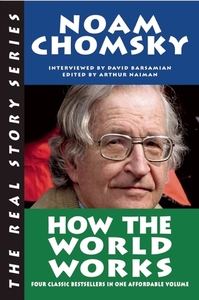Take a photo of a barcode or cover
challenging
hopeful
informative
medium-paced
Chomsky is blunt and direct and can be understood by an 8th grader. He paints a stark and scathing picture of the US state, Corporations, media, and Capital and the evil done by them in our name. One doesn't know anything unless they have read some Chomsky.
I love Chomsky. Mind you it's pretty horrible what he says, but at least he gives you pointers on what to do if you can be bothered and have enough influential friends to help out!
Changed my worldview and gave me words to explain my ideas. An excellent read for anyone who is critical of world politics.
I think it would have been better if there were more explanation about his philosophy before the application. It made it difficult to process everything.
Not sure if it was because it mainly covered the 80s and 90s, or because it was heavily edited, or because I am a leftie English person, but this all read very simple and obvious.
challenging
informative
reflective
slow-paced
How the world works offers no solutions save for one important one: explaining why so many things do not work in the world (e.g., affordable housing, effective policing, or efficient health care).
Because the wealthy don't need or want them.
What can we do about it? "Organize," Chomsky says but isn't anymore prescriptive, and admits that non-organizing can maximize your individual return (e.g, taking a second job instead of organizing a union for more pay) . Many do not like this answer. Chomsky made them feel sad, shattered their reality, so they lash out at the messenger. But I like this answer because it's honest. It all points to the absurdism of modern life that one can only endure, and I am not sure there is much we can do than make a choice that maximizes our material position or our principled position (with a slim hope of maximizing our or our tribe's material position).
There is five star content here but the format of interview responses can be difficult to push through sometimes, especially for some of the content that is outdated, so I only gave it four stars.
Because the wealthy don't need or want them.
What can we do about it? "Organize," Chomsky says but isn't anymore prescriptive, and admits that non-organizing can maximize your individual return (e.g, taking a second job instead of organizing a union for more pay) . Many do not like this answer. Chomsky made them feel sad, shattered their reality, so they lash out at the messenger. But I like this answer because it's honest. It all points to the absurdism of modern life that one can only endure, and I am not sure there is much we can do than make a choice that maximizes our material position or our principled position (with a slim hope of maximizing our or our tribe's material position).
There is five star content here but the format of interview responses can be difficult to push through sometimes, especially for some of the content that is outdated, so I only gave it four stars.
informative
inspiring
slow-paced
Honestly so eye opening. Left me with so many questions.



